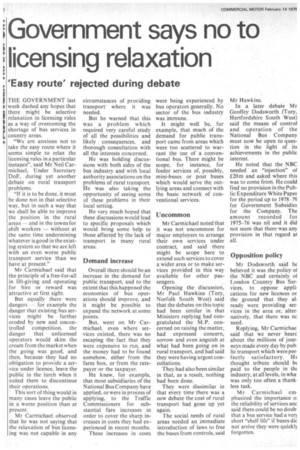Government says no to licensing relaxation
Page 22

If you've noticed an error in this article please click here to report it so we can fix it.
Easy route' rejected during debate
THE GOVERNMENT last week dashed any hopes that There might be selective relaxation in licensing rules as a way of overcoming the shortage of bus services in country areas, "We are anxious not to take the easy route where it seems simple to relax the 'licensing rules in a particular instauce", said Mr Neil Carmichael, Under Secretary DoE, during yet another debate on rural transport problems.
"If it is to be done, it must be done not in that selective way, but in such a way that we shall be able to improve the position in the rural areas — and in the towns for shift workers — without at the same time undermining whatever is good in the existing system so that we are left with an even worse public transport service than we have at present."
Mr Carmichael said that the principle of a free-for-all in lift-giving and operating for hire or reward was attractive at first sight.
But equally there were dangers for example the danger that existing bus services might be further eroded by new and uncontrolled competition, the danger that unlicensed operators would skim the cream from the market when the going was good, and then, because they had no obligation to provide a service under licence, leave the public in the lurch when it suited them to discontinue their operations.
This sort of thing would in many cases leave the public in a worse position than-at present.
Mr Carmichael observed that he was not saying that the relaxation of bus licensing was not capable in any circumstances of providing transport where it was needed.
But he warned that this was a problem which required very careful study of all the possibilities and likely consequences, and thorough consultation with all the interests concerned.
He was holding discussions with both sides of the bus industry and with local authority associations on the problems of rural transport. He was also taking the opportunity of seeing some of these problems in their local setting.
He very much hoped that these discussions would lead to specific proposals which would bring some help to those affected by the lack of transport in many rural areas.
Demand increase
Overall there should be an increase in the demand for public transport, and to the extent that this happened the economics of bus operations should improve, and it might be possible to expand the network at some points.
But, went on Mr CarMichael, even where services existed, there was no escaping the• fact that they were expensive to run, and the money had to be found somehow, either from the fares box, or from the ratepayer or the taxpayer.
He knew, for example, that most subsidiaries of the National Bus Company have applied, or were in process of applying, to the Traffic Commissioners for substantial fare increases in order to cover the sharp increases in costs they had experienced in recent months.
These increases in costs were being experienced by bus operators generally. No sector of the bus industry was immune.
It might well be, for example, that much of the demand for public transport came from areas which were too scattered to warrant the use of a conventional bus. There might be scope, for instance, for feeder services of, possibly, mini-buses or post buses which would serve the outlying areas and connect with the basic network of conventional services.
Uncommon
Mr Carmichael noted that it was not uncommon for major employers to arrange their own services under contract, and said there might be scope here to extend such services to cover a wider area or to make services provided in this way available for other passengers.
Opening the discussion, Mr Paul Hawkins (Tory, Norfolk South West) said that the debates on this topic had been similar in that Ministers replying had congratulated the M.P. concerned on raising the matter, had expressed concern, sorrow and even anguish at what had been going on in rural transport, and had said they were having urgent consultations.
They had also been similar in that, as a result, nothing had been done. i They were dissimilar n that every time there was a new debate the cost of rural transport had gone up yet again.
The social needs of rural areas needed an .immediate introduction of laws to free the buses from controls, said Mr Hawkins.
In a later debate Mr Geoffey Dodsworth (Tory, Hertfordshire South West) said the means of control and operation of the National Bus Company must now be open to question in the light of its achievements in the public interest.
He noted that the NBC needed an "injection" of 00m and asked where this was to come frOm. He could find no provision in the Public Expenditure White Paper for the period up to (978-79 for Government Subsidies for the Company. The amount recorded for 1975-76 was nil and it did not seem that there was any provision in that regard al all.
Opposition policy
Mr Dodsworth said ht believed it was the policy al the NBC and certainly ol London Country Bus Services, to oppose applications for new licences or the ground that they already were providing services in the area or, alternatively, that there was nc need.
Replying, Mr Carmichae said that we never hearc about the millions of jour. neys made every day by pub. lic transport which were per. fectly satisfactory. H.( thought tribute should b( paid to the people in du industry, at all levels, in wha. was only too often a thank. less task.
Mr Carmichael em. phasized the importance 01 the reliability of services anc said there could be no doub. that a bus service had a ver3 short "shelf life" if buses clic not arrive they were quick13 forgotten.




































































































